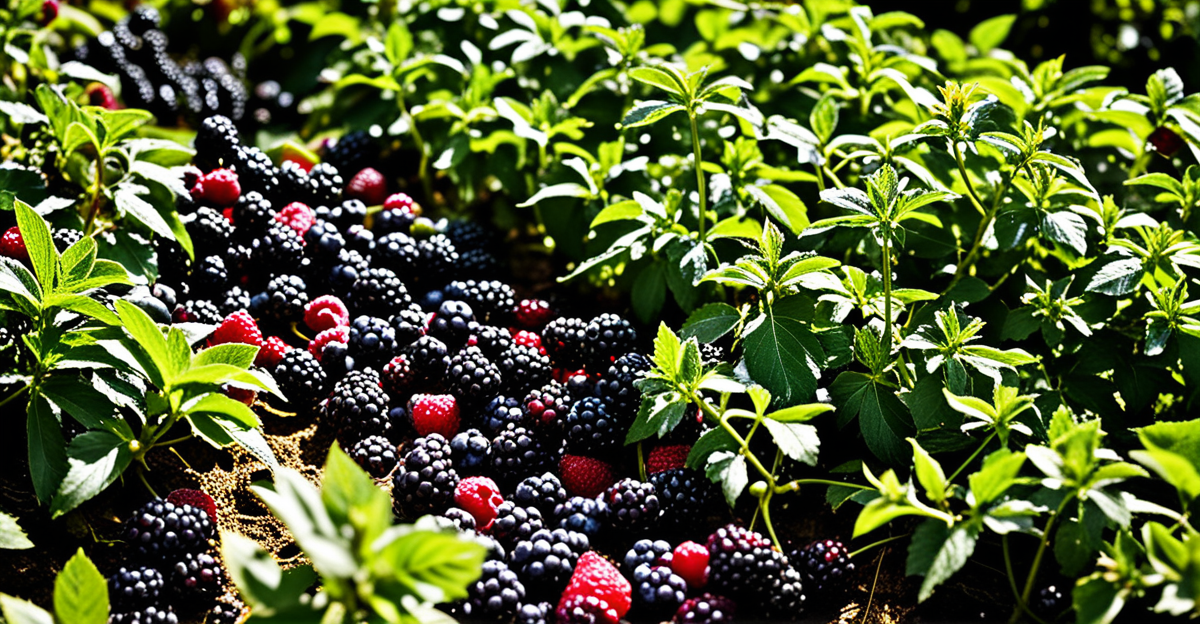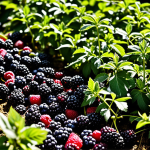Choosing the Best Exotic Berry Varieties for Warm UK Gardens
Selecting exotic berries UK that thrive in warm climate gardening requires understanding which species tolerate milder winters and benefit from the UK’s increasing microclimates. Varieties such as the Chilean Guava (Ugni molinae), Hardy Kiwi (Actinidia arguta), and Asian Wineberry are standout choices due to their ability to flourish in less frosty, sheltered UK gardens.
These best berry plants are not only heat tolerant but also offer unique flavour profiles that differ from traditional berries. For example, Chilean Guava produces small, aromatic berries with a sweet, slightly tangy taste. Hardy Kiwi delivers clusters of smooth-skinned, grape-sized fruits that add a tropical twist to UK gardens. Asian Wineberry provides bright red berries with a tart yet refreshing flavour, suitable for fresh eating or preserves.
Also to read : Cultivating figs in the uk: proven tips for successful growth and expert pruning techniques
When sourcing these plants, opting for reputable nurseries specializing in exotic varieties ensures plant health and authenticity. Nurseries in the UK with expertise in exotic berries UK often provide cultivars selected for local microclimates, raising the chance of successful growth indoors or in garden borders.
Considering berry characteristics such as growth habit, yield, and flavour is essential. For instance:
Additional reading : Harness the rain: ultimate guide to cultivating a thriving eco-friendly garden in the uk
- Chilean Guava tends to be a spreading shrub, ideal for hedges or container cultivation.
- Hardy Kiwi vines need sturdy support structures and can yield abundantly once mature.
- Asian Wineberry branches vigorously, requiring pruning but offering high fruit yields.
In summary, choosing heat-tolerant exotic berry species adapted to UK conditions marries the joys of warm climate gardening with rewarding harvests, making the garden a delightful haven for unique, flavourful berries.
Preparing the Ideal Growing Environment
Creating the right foundation for exotic berries UK starts with careful soil preparation. These heat-tolerant species often require well-drained, fertile soil rich in organic matter. To improve existing soil, gardeners should incorporate compost or well-rotted manure, enhancing nutrient content and moisture retention. Testing soil pH is also important—most exotic berries perform best in slightly acidic to neutral ranges (pH 5.5 to 7). Adjusting pH with garden lime or sulfur can optimize conditions.
Maximising the benefits of warm climate gardening in the UK involves microclimate management. Identifying the warmest, most sheltered spots in your garden can protect delicate plants from cold winds and frost pockets. South-facing walls, lean-tos, or areas with reflective surfaces create a microenvironment that boosts temperatures and extends the growing season. Positioning exotic berries in these areas can markedly improve fruit yield and plant health.
Effective irrigation is vital for consistent moisture, which supports vigorous fruiting in the best berry plants. Drip irrigation or soaker hoses deliver water directly to the roots, reducing evaporation and disease risk. Mulching around the base with straw or bark chips also conserves moisture, regulates soil temperature, and suppresses weeds. These berry gardening tips ensure plants withstand warmer, drier spells characteristic of UK microclimates adapting to climate change.
Combining precise soil amendments, strategic microclimate use, and practical watering techniques paves the way for robust, productive growth of exotic berries suited to the UK’s evolving warm climate gardening landscape.
Step-by-Step Planting and Care for Exotic Berries
Establishing healthy exotic berries UK plants begins with proper planting techniques. The best time for planting is early spring or autumn when soil temperatures are moderate, allowing roots to settle without stress. Dig holes twice as wide as the root ball to encourage outward growth. Amending the soil with compost enhances fertility and drainage, vital for establishing berry bushes that thrive in warm climate gardening settings.
Supporting early growth is critical. For vining species like Hardy Kiwi, install sturdy stakes or trellises at planting to guide vertical growth and improve airflow, reducing disease risk. Pruning young plants encourages bushier development and increases fruiting potential. Removing weak or crossing branches helps energy focus on strong shoots, a key part of effective berry plant care.
Seasonal routines play a large role in maintaining plant health and maximizing yields. In spring, apply balanced fertiliser to boost growth; during summer, monitor irrigation closely, adapting watering to rainfall and heat conditions. Autumn pruning removes dead wood and shapes the plant for next year’s growth. Mulching throughout the year conserves moisture and suppresses weeds, integral to sustainable berry gardening tips.
Together, precise planting methods, structured support, and consistent seasonal care establish a solid foundation for successfully growing best berry plants adapted to the UK’s evolving climate.
Managing Pests, Diseases, and Climate Stresses
Protecting exotic berries UK from pests and diseases is crucial for maintaining healthy plants and bountiful harvests. Common pests include aphids, spider mites, and vine weevils, which can cause leaf damage, stunted growth, or root harm. Disease threats often come from fungal infections like powdery mildew and botrytis, especially in humid conditions. Early identification is key: inspect leaves regularly for discoloration, spotting, or wilting symptoms to catch problems before they spread.
Integrated pest management (IPM) offers natural, effective solutions for pest control without heavy reliance on chemicals. Introducing beneficial insects such as ladybirds and predatory mites helps balance harmful pest populations. Crop rotation and removing infected plant debris minimize disease carryover. Applying organic sprays like neem oil or insecticidal soap targets pests while preserving beneficial species, supporting the sustainability of warm climate gardening practices.
Heatwaves and erratic weather common in the UK’s changing climate pose additional challenges for exotic berry cultivation. Heat stress can cause leaf scorch, fruit drop, and reduced flowering. To mitigate this, providing shade during peak sunlight with shade cloths or planting near larger trees creates cooling microclimates. Consistent watering, preferably with drip irrigation systems, helps maintain soil moisture and reduce drought stress. Mulching aids in temperature regulation and limits evaporation, essential for berry gardening tips amid fluctuating weather.
Preparing for unseasonable cold snaps or late frosts involves covering vulnerable plants with fleece or horticultural fabric overnight, safeguarding blossoms and young growth. Selecting proven heat-tolerant varieties further enhances resilience in UK microclimates adapting to warmer conditions.
By combining vigilant disease management, natural pest control techniques, and strategic responses to climatic stresses, gardeners can ensure their best berry plants remain vigorous and productive throughout the changing seasons.
Inspiring Success Stories from UK Gardeners
Discovering thriving exotic berries UK gardens in warmer regions offers valuable insights for gardeners embracing warm climate gardening. Many UK gardeners report bountiful harvests of best berry plants like the Chilean Guava and Hardy Kiwi, which adapt well to local microclimates. These success stories highlight how selecting the right site, combined with diligent care, transforms challenging conditions into fruitful results.
For example, a gardener in southern England shared how placing exotic berries near a south-facing wall created a sheltered, heat-retentive environment that significantly improved fruit yield. By combining this with tailored irrigation and mulching—key berry gardening tips—they achieved earlier ripening and sweeter berries compared to previous years. Regular pruning and pest vigilance also played vital roles in sustaining plant health and productivity.
Other gardeners report success using container planting to manage soil quality and microclimate control precisely. This method allows relocation during extreme weather, demonstrating adaptability essential for warm climate gardening with exotic species. Their stories emphasize experimenting with cultivars sourced from reputable nurseries specializing in heat-tolerant varieties, ensuring authenticity and robust growth.
Collectively, these experiences illustrate how commitment to understanding plant needs and environmental nuances leads to flourishing exotic berries. Gardeners new to this path can look to these narratives for encouragement, practical strategies, and realistic expectations when cultivating best berry plants adapted to the UK’s evolving climate.
Choosing the Best Exotic Berry Varieties for Warm UK Gardens
Selecting exotic berries UK that thrive specifically in warm climate gardening hinges on identifying heat-tolerant varieties suited to the UK’s evolving microclimates. Among the best berry plants, species like the Chilean Guava, Hardy Kiwi, and Asian Wineberry stand out for their resilience to milder winters and capacity to flourish in sheltered garden areas that experience higher temperatures.
When evaluating these exotic berries, flavour, yield, and growth habit are crucial considerations. Chilean Guava offers small, fragrant berries with a balance of sweetness and tang, ideal for fresh consumption or preserves. Hardy Kiwi produces vine-born, grape-sized fruits with smooth skins and a tropical flavour, benefiting from sturdy trellis support. Asian Wineberry distinguishes itself with vigorous branching and abundant bright red fruit, making it a rewarding choice despite requiring regular pruning.
Sourcing authentic, vigorous plants from reputable nurseries within the UK is fundamental to success. Nurseries specialising in exotic berries UK often provide cultivars pre-selected for local climate adaptability, increasing the likelihood of robust growth and fruitful harvests. Purchasing from trusted suppliers reduces risks of disease and ensures accurate variety labelling, which is essential for gardeners aiming to cultivate the best berry plants tailored to warm UK environments.
In summary, prioritising heat-tolerant, flavourful exotic berry varieties combined with sourcing from knowledgeable UK nurseries enables gardeners practising warm climate gardening to enjoy unique and productive berry crops in their gardens.










